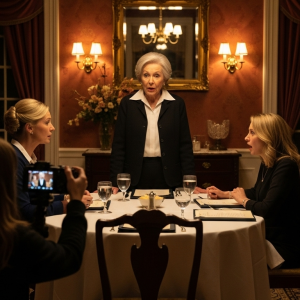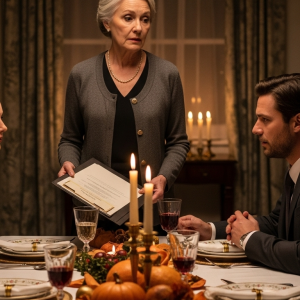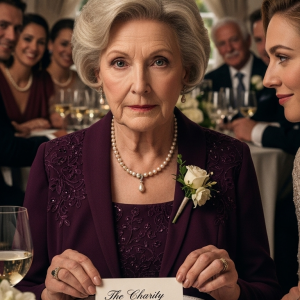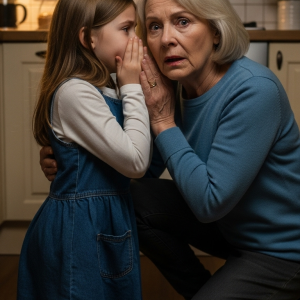I never thought I would see her there. Among the dozens of people in faded, yellow hospital gowns, their faces etched with weariness, she sat quietly in a corner of the hallway. She looked so small, so utterly alone, as if the entire world had turned its back on her. In that instant, a phantom hand seemed to reach into my chest and squeeze my heart. She was Maya—my ex-wife, the woman I had divorced just two months ago.
My name is Arjun. I’m 34 years old, an ordinary office worker living an ordinary life. For five years, my marriage had been the stable, predictable anchor of that life. My wife, Maya, was a gentle, kind woman. She wasn’t a head-turner, not in the way the world defines beauty, but she possessed a quiet grace that made our house feel like a home, a sanctuary I could return to at the end of each day.
We dreamed the simple dreams of any other couple: saving for a house, the laughter of children filling the rooms, a small, happy family. But after three years of marriage, and after two devastating miscarriages, the atmosphere in our home began to curdle. The light in Maya’s eyes dimmed. She began to speak less, her gaze often drifting to a distant, sorrowful place I couldn’t reach.
The silence she carried became a weight. I grew tired of coming home from the stresses of work only to be met with sighs and a quiet, impenetrable sadness. I will not deny my fault in what happened next. I started coming home later, using deadlines as an excuse to avoid the emptiness that had settled between us. I stopped asking how she was, because I was afraid of the answer.
Gradually, petty arguments began to sprout in the barren soil of our silence. They were never about anything important, but they were frequent and draining. One grey afternoon in April, after a short but tedious argument about something I can no longer remember, the words I had been rehearsing in my mind for weeks finally came out.
“Let’s get a divorce, Maya,” I said, my voice barely a whisper.
She looked at me for a long, searching moment, her dark eyes holding mine. There was no shock in them, only a deep, weary acceptance. “You’ve decided, haven’t you?” she asked.
I could only nod. She didn’t cry or scream as I had braced myself for. She just gave a single, silent nod and began packing her clothes that very night. The divorce papers were signed quickly, with a chilling efficiency, as if we had both been mentally prepared for this ending for a long time.
After the divorce, I moved into a modern, sterile apartment in New Delhi. I lived the life of a free man: work in the morning, drinks with friends at night, movies on the weekend. There was no one to cook for me, no soft sound of slippers on the floor in the morning, no familiar, gentle voice asking, “Have you eaten yet?” I was sure I had made the right decision. At least, that’s what I told myself.
Two months passed. I was living like a shadow in my new, empty life. I often woke up in the middle of the night, my heart pounding from a nightmare, the ghost of Maya’s name on my lips.
That day, I went to visit my best friend, Rohit, at the AIIMS hospital in New Delhi. He had just undergone minor surgery. As I walked down the long, antiseptic-smelling corridor of the Department of Internal Medicine, I saw her.
She sat in that pale blue hospital gown, her beautiful long hair—the hair she had loved so much—cut shockingly short. Her face was gaunt and pale, and her eyes, once so full of life, were desolate and empty. An IV drip stand stood beside her like a silent, grim companion.
I just stood there, frozen, my own heart pounding in my ears. A thousand questions flooded my mind: What happened to her? Why didn’t anyone tell me? Why is she all alone?
My feet felt like lead as I walked toward her, my own voice a trembling stranger’s.
“Maya?”
She looked up, and for a fleeting moment, a flicker of surprise sparked in her desolate eyes before it was extinguished.
“…Arjun?” she breathed, her voice raspy.
“What are you doing here?” I asked, my voice tight with a sudden, fierce urgency. “What’s wrong with you?”
She immediately turned away, avoiding my gaze, her shoulders hunched as if to hide. Her voice was as faint as the wind. “Nothing… It’s just a routine health check.”
“A health check?” I repeated, my voice rising. “Maya, look at you. You’re wearing a hospital gown, you’re hooked up to an IV. Don’t lie to me.”
I sat down beside her on the cold bench and took her hand. It was as cold as ice. “You don’t have to hide from me,” I pleaded, my own fear making my voice shake. “Seeing you like this… How can I just walk away?”
A long moment of silence passed between us. Finally, she spoke, her voice so soft I had to lean in to hear it.
“I… I have early-stage ovarian cancer,” she said. “The doctors say it’s treatable if I follow the regimen. But… I don’t have insurance that covers this, and I don’t have much money left. I didn’t want to bother anyone.”
I was stunned. Her words were like a physical blow, a knife twisting directly into my heart. For the past two months, I had been living in a selfish, artificial peace, while she—the woman who was once my wife, the woman who had lain in my arms every night—was fighting this terrifying battle completely and utterly alone.
“Why?” I choked out, the word thick with a guilt that was suffocating me. “Maya, why didn’t you tell me?”
“We’re divorced, Arjun,” she said, a sad, faint smile touching her lips. “I didn’t want to be a burden to you anymore. I… I thought I could handle it on my own.”
I couldn’t find the words to respond. Guilt, swift and merciless, engulfed me like a tidal wave. I thought of every late night I’d come home, every cold shoulder I’d given her, every sigh of frustration. I had seen her suffering as an inconvenience, a weight I needed to shed.
I sat with her until the evening visiting hours were over. For the first time in months, we talked. We talked like we used to, like family—with no blame, no pride, just two people sharing a space of quiet sorrow.
Before I left, I held her cold hand in mine. “Maya, let me be here with you. I know we are no longer husband and wife, but I cannot leave you to face this alone. I won’t.”
She just looked at me with those tired, beautiful eyes. “Is it because you pity me?”
“No,” I said, the truth of the words surprising even me as they came out. “It’s because… I still love you.”
The next morning, I returned to AIIMS with a container of hot khichdi and a bag of fresh oranges. Maya seemed surprised to see me again, but she didn’t say anything. A silent understanding passed between us. Over the next few days, I took a leave of absence from my job. I became her shadow, her advocate, her caregiver. I took her to every check-up, waited with her for every test result, and copied down every dietary instruction from the doctor. I didn’t know if I was doing it for her or for me—to atone for my sins, or simply because I couldn’t bear the thought of being anywhere else.
One afternoon, as I was plumping the pillows on her hospital bed, Maya spoke, her voice startlingly clear in the quiet room.
“Did you know… I found out I was sick before the divorce?”
I froze, the pillow dropping from my hands. “What?”
“A week before you asked for the divorce,” she continued, her gaze fixed on the ceiling, “I went to the doctor because of a constant, nagging pain in my stomach. The biopsy results came back on the same day we had that last fight.”
I stared at her, my mind unable to process her words. It felt as if someone had reached in and stopped my heart from beating. “Why?” I whispered, my voice breaking. “Maya, in God’s name, why didn’t you say anything?”
“Because I knew,” she said, finally turning to look at me, her eyes filled with a heartbreaking clarity. “If I told you then, you would have stayed. But you would have stayed out of a sense of responsibility, out of duty. Not because you still loved me. I didn’t want that for you, Arjun. I wanted you to be free, not a man chained to a sick woman’s bedside.”
I staggered back, tears I couldn’t hold back streaming down my face. “Do you think I’m that kind of person? Do you think your pain wouldn’t have been my pain?”
Maya looked at me for a long time. She offered a small, calm smile, the calmest I had ever seen on her face. “It’s not that I don’t believe in your goodness, Arjun. But I could not bear to watch you pretend to be happy, day after day, while you spent your life with a sick person. I could not be the source of your lifelong burden.”
I couldn’t answer her, because I knew, to my eternal shame, that she was partly right. At that point in our marriage, I had wanted to leave. I had considered her sadness a burden, never once imagining the true, monstrous weight she was carrying all by herself.
A week later, Maya began chemotherapy. I arranged for a folding cot and moved into her hospital room. For the first time in years, I learned to truly listen. I sat with her through the waves of nausea, held her when the pain was too much, and learned to cherish the small, fleeting moments of laughter she could still find.
One night, while she was sleeping, her breathing shallow and peaceful for once, I was organizing the small bag of belongings she’d brought with her. Tucked inside a side pocket, I found a small, sealed envelope. On the front, in her familiar, elegant script, were the words: “For Arjun, if you ever read this.”
My hands trembled. After a few seconds of heart-pounding hesitation, I carefully opened the letter.
My Dearest Arjun,
If you are reading this, I may no longer have the strength to tell you these things myself. I know how much my silence and coldness hurt you in those last few months. Please know, it was never about you. It was about protecting you.
I became pregnant again, Arjun. For a very short, precious time. I didn’t dare tell you. I was so afraid of another loss, of seeing that hope die in your eyes again. And my fear came true… I lost our baby at six weeks. The doctor said my body was weak… and that the loss was likely because of the tumor that was already growing inside me.
I agreed to the divorce to give you a chance at a happy life. I wanted your last memories of me to be beautiful, not of a withered, sick wife who smelled of antiseptic. But please, always know that I loved you. I loved you so much. I just decided to keep that love with me, as my own private treasure.
If I could go back, I would still choose to let you go. Because you deserve to live a full and vibrant life.
Thank you, my love, for everything.
I clutched the letter to my chest, my body shaking with silent, wracking sobs. The world tilted on its axis. Another miscarriage. The cancer. Her decision to walk away from our home, from me, with all of this locked inside her… it was all to keep me from hurting. But this truth, this devastating revelation of her silent sacrifice, hurt a thousand times more than anything else possibly could.
A week later, Dr. Kapoor, Maya’s oncologist, called me into his office. “Maya’s condition is deteriorating,” he said gently but directly. “The tumor is not responding well to the chemotherapy. We will try another, more aggressive treatment, but I must be honest with you. The chances are not high.”
I felt the last of my strength drain away. For the first time in my life, I was truly, utterly terrified of losing someone.
That night, I held her frail hand in the dim light of the hospital room. She was weak, barely able to speak. I sat beside her and whispered in her ear.
“If it’s possible… I want to marry you again, Maya. I don’t care about papers or ceremonies. I just want to wake up and see you every morning, and hold your hand like this every night. We don’t have to start over. We just have to be together, for as long as we can.”
Maya smiled faintly, her fingers weakly stroking my cheek. A tear rolled down her temple, but her smile remained.
“I… I agree,” she whispered.
In the days that followed, we had a small, simple ceremony right there in her hospital room. A kind nurse tied a bracelet of red thread around our joined wrists. Someone had left a bouquet of marigolds, which we used as our decoration. There was no music, no guests, just the rhythmic beep of the IV machine and the sound of our whispered promises.
Three months later, Maya passed away peacefully in my arms. In that short, precious time, we were husband and wife again, in a way that was truer and deeper than our first five years had ever been. I still keep the photo from that simple hospital wedding and the letter she left for me. They are the sacred testaments of the woman who loved me enough to endure unimaginable pain in silence.
I don’t cry every night anymore. But every time I walk through the corridors of that old AIIMS hospital, I remember her astonished look—the look that changed the rest of my life. And sometimes, in the midst of the hustle and bustle of New Delhi, I can still hear a very low whisper on the wind: “Thank you for loving me.”




